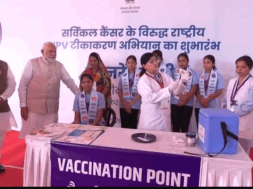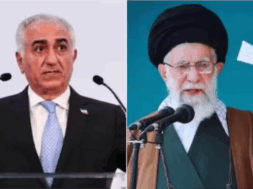
Manas Dasgupta
NEW DELHI, Dec 29: The Election Commission of India (ECI) has developed a prototype for a Remote Electronic Voting Machine (RVM) with migrant voters in mind. Remote Electronic Voting Machines (RVM) can handle multiple constituencies from a single remote polling booth and will enable the migrant voters to cast their votes remotely without going to their respective constituencies.
Announcing this, the ECI on Thursday said it had invited all the eight major national parties and 57 recognised regional parties on January 16 to demonstrate the functioning of the multi-constituency prototype Remote EVM and has already shared a concept note with them on legal, operational, administrative and technological challenges.
The commission has solicited written views of recognised political parties by January 31 on various related issues including changes required in legislation, changes in administrative procedures and voting method or RVM technology, if any other, for the domestic migrants. Based on feedback from various stakeholders and the demonstration of the prototype, the ECI will appropriately carry forward the process of implementing remote voting, according to a statement by the ECI.
The multi-constituency remote EVM, developed by a public sector undertaking, can handle up to 72 constituencies from a single remote polling booth, the statement issued by the poll watchdog said.
Terming counting of votes cast at remote booths and their transmission to the returning officer (RO) in other states as a “technological challenge”, ECI officials said RVMs would be developed as “a robust, fail-proof and efficient stand-alone system” based on existing electronic voting machines and would not be connected to the internet.
The ECI sources said the idea was to implement voter portability as a pilot project in the upcoming Assembly elections in nine states in 2023. This means that if the pilot is successful then in the 2024 general elections voter portability can be fully implemented.
“Migration-based disenfranchisement is indeed not an option in the age of technological advancement. The voter turnout in General Elections 2019 was 67.4% and the Election Commission of India is concerned about the issue of over 30 crore electors not exercising their franchise and also differential voter turnout in various States/Union Territories,” the commission said in a statement.
“After focus on youth and urban apathy, remote voting will be a transformational initiative for strengthening participation in electoral democracy,” Chief Election Commissioner (CEC) Rajiv Kumar said.
Soon after assuming office as Chief Election Commissioner, Kumar’s learning of domestic migration issues first hand from his trek to Dumak village in Chamoli district, focused his attention on enabling the migrant voters to exercise their franchise from their current place of residence. Realising such empowerment would entail a host of legal, statutory, administrative and technological interventions, ECI team has deliberated at length to find inclusive solutions to facilitate electoral participation of migrants across all socio-economic strata and explored alternative voting methods like two-way physical transit postal ballots, proxy voting, early voting at special Early Voting Centres, one-way or two-way electronic transmission of postal ballots (ETPBS), Internet-based voting system etc.
With the objective of finding a technological solution that is credible, accessible and acceptable to all stakeholders, the commission headed by CEC Kumar along with election commissioners Anup Chandra Pandey and Arun Goel “has now explored the option of using a modified version of the time-tested model of M3 (Mark 3) EVMs to enable voting at remote polling stations — polling stations outside home constituency, for domestic migrants,” the statement said.
The commission said a concept note has been circulated amongst political parties highlighting the challenges of defining domestic migrants, implementation of Model Code of Conduct, ensuring secrecy of voting, facility of polling agents for identification of voters, process and method of remote voting, and counting of votes amongst other issues.
Among the laws and rules which would need an amendment to implement remote voting is The Representation of People’s Act of 1950 and 1951, The Conduct of Election Rules, 1961 and The Registration of Electors Rules, 1960.
The definition of migrant voter would also need to be reworked with respect to retaining registration at the original place in the context of the legal construct of “ordinary residence” and “temporary absence”. Also, the territorial constituency concept of remote voting and defining remoteness itself that is an outside constituency, outside district or outside state will need to be dealt with.
The administrative challenges include enumerating remote voters-self declaration, ensuring secrecy of voting at remote locations, provision of polling agents at remote voting booths, and ensuring identification of voters to avoid impersonation.
Other areas to work on would include the appointment of polling personnel for remote polling stations and supervision thereof, the number of polling booths to be set up and their locations, the appointment of polling personnel for remote polling stations and implementation of Model Code of Conduct in remote locations. Some of the technological challenges would be the method of remote voting, the familiarity of the voters with the Multi-Constituency Remote EVM and counting of votes.
The ECI noted that there were multifarious reasons for a voter not opting to register in a new place of residence, thus missing out on exercising the right to vote. The inability to vote due to internal migration is one of the prominent reasons to be addressed to improve voter turnout and ensure participative elections. Out-migration due to the need to work, marriage, and education, is predominant among the rural population in overall domestic migration. Approximately 85% of the internal migration is within the States.
“The initiative, if implemented, can lead to a social transformation for the migrants and connect with their roots as many times they are reluctant to get themselves enrolled at their place of work for various reasons such as frequently changing residences, not enough social and emotional connect with the issues of an area of migration, unwillingness to get their name deleted in the electoral roll of their home/native constituencies as they have permanent residence/property,” the ECI said.














